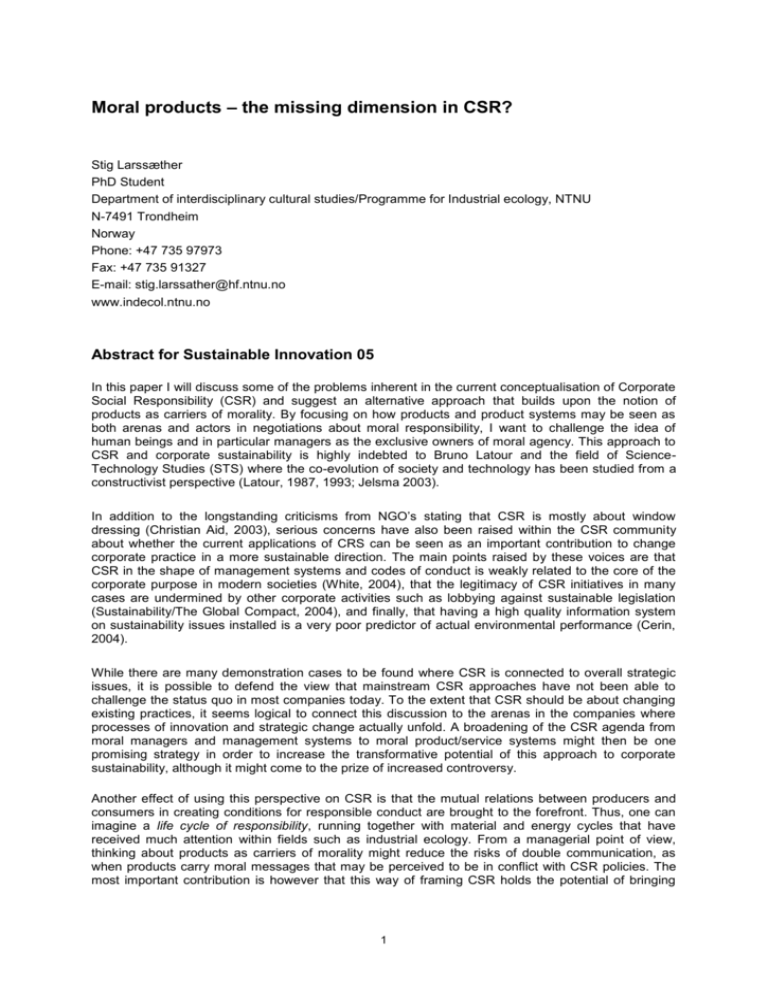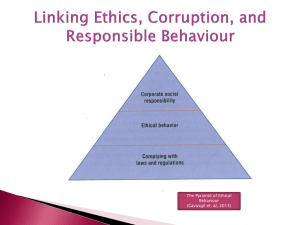Abstract for Sustainable Innovation 05
advertisement

Moral products – the missing dimension in CSR? Stig Larssæther PhD Student Department of interdisciplinary cultural studies/Programme for Industrial ecology, NTNU N-7491 Trondheim Norway Phone: +47 735 97973 Fax: +47 735 91327 E-mail: stig.larssather@hf.ntnu.no www.indecol.ntnu.no Abstract for Sustainable Innovation 05 In this paper I will discuss some of the problems inherent in the current conceptualisation of Corporate Social Responsibility (CSR) and suggest an alternative approach that builds upon the notion of products as carriers of morality. By focusing on how products and product systems may be seen as both arenas and actors in negotiations about moral responsibility, I want to challenge the idea of human beings and in particular managers as the exclusive owners of moral agency. This approach to CSR and corporate sustainability is highly indebted to Bruno Latour and the field of ScienceTechnology Studies (STS) where the co-evolution of society and technology has been studied from a constructivist perspective (Latour, 1987, 1993; Jelsma 2003). In addition to the longstanding criticisms from NGO’s stating that CSR is mostly about window dressing (Christian Aid, 2003), serious concerns have also been raised within the CSR community about whether the current applications of CRS can be seen as an important contribution to change corporate practice in a more sustainable direction. The main points raised by these voices are that CSR in the shape of management systems and codes of conduct is weakly related to the core of the corporate purpose in modern societies (White, 2004), that the legitimacy of CSR initiatives in many cases are undermined by other corporate activities such as lobbying against sustainable legislation (Sustainability/The Global Compact, 2004), and finally, that having a high quality information system on sustainability issues installed is a very poor predictor of actual environmental performance (Cerin, 2004). While there are many demonstration cases to be found where CSR is connected to overall strategic issues, it is possible to defend the view that mainstream CSR approaches have not been able to challenge the status quo in most companies today. To the extent that CSR should be about changing existing practices, it seems logical to connect this discussion to the arenas in the companies where processes of innovation and strategic change actually unfold. A broadening of the CSR agenda from moral managers and management systems to moral product/service systems might then be one promising strategy in order to increase the transformative potential of this approach to corporate sustainability, although it might come to the prize of increased controversy. Another effect of using this perspective on CSR is that the mutual relations between producers and consumers in creating conditions for responsible conduct are brought to the forefront. Thus, one can imagine a life cycle of responsibility, running together with material and energy cycles that have received much attention within fields such as industrial ecology. From a managerial point of view, thinking about products as carriers of morality might reduce the risks of double communication, as when products carry moral messages that may be perceived to be in conflict with CSR policies. The most important contribution is however that this way of framing CSR holds the potential of bringing 1 other parts of the organization into the discussion about corporate sustainability, increasing the correspondence between intentions and actual practice. References and sources Cerin, P. (2004), ‘Where is corporate social responsibility actually heading?’ Progress in industrial ecology, 1, (1/2/3), pp.307-330. Christian Aid (2003). Behind the mask of Corporate Social Responsibility. (www.christianaid.org.uk) Jelsma, J. (2003), ‘Innovating for sustainability: involving users, politics and technology’. Innovation: The European Journal of Social Sciences, 16,(2), pp 103-116 Latour, B. (1987), Science in action (Harward University Press). Latour, B. (1992), ‘Where are the missing masses? The sociology of a few mundane artefacts’, Bijker, Wiebe and Law, John (eds.):Shaping technology/building society.Studies in sociotechnical change (MIT Press, Cambridge). SustainAbility/The Global Compact (2004) “Gearing up. From corporate responsibility to good governance and scalable solutions, www.unglobalcompact.org White, A. L. (2004). Lost in transition? The future of corporate social responsibility. In The Journal of Corporate Citizenship, 16, Winter 2004, 19-24. 2







